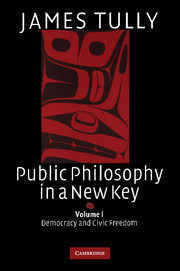Book contents
- Frontmatter
- Contents
- Acknowledgments
- Credits
- INTRODUCTION
- PART 1 APPROACHING PRACTICE
- 1 Public philosophy as a critical activity
- 2 Situated creatively: Wittgenstein and political philosophy
- 3 To think and act differently: comparing critical ethos and critical theory
- PART 2 DEMOCRACY AND RECOGNITION
- PART 3 INDIGENOUS PEOPLES
- CONCLUSION
- Bibliography
- Index to Volume I
- IDEAS IN CONTEXT
2 - Situated creatively: Wittgenstein and political philosophy
Published online by Cambridge University Press: 05 September 2012
- Frontmatter
- Contents
- Acknowledgments
- Credits
- INTRODUCTION
- PART 1 APPROACHING PRACTICE
- 1 Public philosophy as a critical activity
- 2 Situated creatively: Wittgenstein and political philosophy
- 3 To think and act differently: comparing critical ethos and critical theory
- PART 2 DEMOCRACY AND RECOGNITION
- PART 3 INDIGENOUS PEOPLES
- CONCLUSION
- Bibliography
- Index to Volume I
- IDEAS IN CONTEXT
Summary
INTRODUCTION
My aim in this chapter is to show the importance of Wittgenstein for the kind of non-transcendental and non-foundational critical public philosophy and freedom of citizens situated in the world of practices and relationships that I sketched in Chapter 1. I do this by using Wittgenstein's work to draw our attention to, and so enable us to free ourselves from, a widespread but mistaken convention of much of contemporary political thought. This is the assumption that our way of political life is free and rational only if it is founded on some form of critical reflection on the background conditions of possibility of human action that transcend the situated world of everyday activities of citizens and public philosophers. I do this by means of a survey of two well-known practices of critical reflection that have been presented as candidates for this foundational role: the justificational or validational form advanced by Jürgen Habermas and the interpretative or hermeneutical form advanced by Charles Taylor. It is our engagement in the discussion itself – the discussion in the philosophy of social science between critical theory and hermeneutics, among others, about which form of critical reflection is essential to political freedom and reason – that tends to hold in place, beyond question, and thereby render conventional, the rule that some form must be foundational.
- Type
- Chapter
- Information
- Public Philosophy in a New Key , pp. 39 - 70Publisher: Cambridge University PressPrint publication year: 2008

